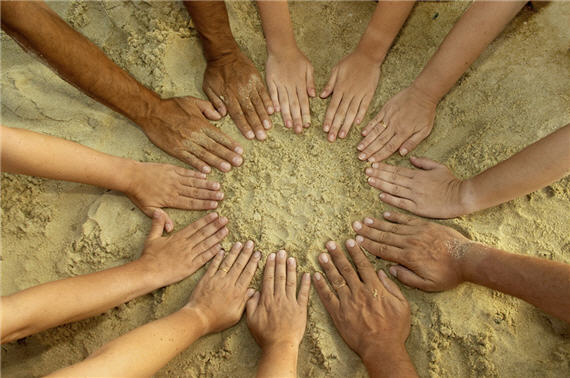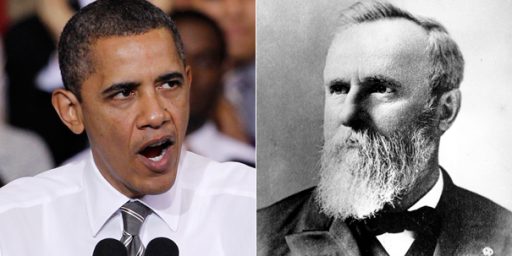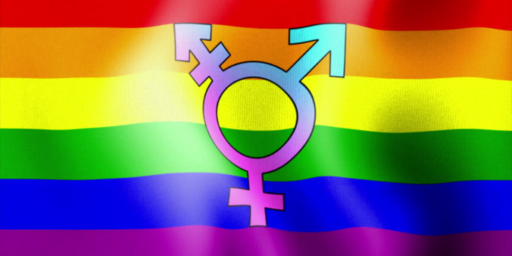Diversity on TV Talk Shows
MSNBC's Chris Hayes uses a quota system to make sure his guests aren't all white dudes.
MSNBC’s Chris Hayes uses a quota system to make sure his guests aren’t all white dudes.
CJR (“Quotas get results“):
[E]arlier this month, after MSNBC announced it was giving Chris Hayes his own daily primetime news show, Media Matters published a chart that showed how his weekend show, Up with Chris Hayes, differed from its cable-news competitors: It wasn’t all white dudes. Specifically, 57 percent of the show’s guests were not white men. (Full disclosure: I have, in the past, been one of the non-dudes featured on said program.) To hear lots of journalists tell it, this is an impossible feat. So I called up Hayes to ask how he and his team created a shining oasis of diversity in a cable-news desert of sameness.
“We just would look at the board and say, ‘We already have too many white men. We can’t have more.’ Really, that was it,” Hayes says. “Always, constantly just counting. Monitoring the diversity of the guests along gender lines, and along race and ethnicity lines.” Out of four panelists on every show, he and his booking producers ensured that at least two were women. “A general rule is if there are four people sitting at table, only two of them can be white men,” he says. “Often it would be less than that.”
If they did end up booking a show that featured a majority of white men, they’d call it “taking a gender hit.” Hayes explains, “and then we’d be like, well, we have to make up for that either in the second half of the show or on the Sunday show.”
This is a radical concept, but it’s certainly made his show stand out from the competition. Aside from the quotas, though, this is possible because of another decision: Hayes simply covers different topics than the other shows.
“The editorial decisions, the content we decided to pursue, also dovetailed with that,” he continues. “We had three Iraqis join us when we talked about the 10-year anniversary of the war. We did a full show about feminism. And so, part of it is that we weren’t talking about the Ryan budget every week. Often we were discussing topics on which there was a natural affinity between people of backgrounds different than the standard one that is often presented on television.”
But sometimes national politics is the hottest topic, and some argue that media can’t be held to a diversity standard when women and people of color are so drastically underrepresented in relevant spokesperson and leadership positions. Hayes acknowledges that, for shows like Meet the Press, there’s probably something to that excuse. But most news outlets aren’t only talking to senators and CEOs. There’s a wide range of perspectives that can be brought to bear on any number of political issues. And, without a quota, it’s easy to default to the same handful of big names.
To me—and granted, I’m a white dude, although not one who’s on national television all that often—this is more important than the racial and gender diversity. One of the main reasons I so seldom watch these shows is that they’re so incredibly repetitious and predictable. Frankly, if Hayes were talking about the same subjects as “Meet The Press” and “This Week,” I’m not sure that the conversation would be radically different simply because some of the faces are other-than-white or because half the guests wore dresses instead of business suits. Sure, race and sex have an impact on perspective. But, since we’d likely be pulling from the same pool of bicoastal elites, we’d still get a pretty narrow perspective.
For that matter, the reason that it gets tiresome to constantly see John McCain, Lindsey Graham, and Chuck Shumer on every show isn’t because they’re white dudes of a certain age. Rather, it’s because we already know what they think and have heard their views ad infinitim. If instead they had Dan Drezner, John Cole, Glenn Greenwald, and Daniel Larison on the panel, we’d get a far more diverse and refreshing set of viewpoints—even though all of them are white and male.
Indeed, moreso than making sure he gets women and people of color—even women of color!—on his show what makes “Up With Chris!” so different is that his guests typically aren’t national politicians, grizzled old pundits, and political operatives but rather actual subject matter experts whose voices seldom reach a national audience.







Well, now we know why Reihan Salam appears on his show. I thought Hayes was a liberal who actually listened to conservative points of view. Maybe, maybe not.
To be fair, Hayes also calls in white conservatives, like Joshua Barro and Maggie Gallagher.
According to the 2010 Census 2 of 3 Americans are white and not Hispanic, 1 of 6 is Hispanic, and 1 of 8 is black. Among adult Americans the percentages of whites and blacks are somewhat higher, the percentage of Hispanics somewhat lower.
Breaking that down by gender and race since the numbers of men and women are roughly equal (the number of women is actually very slightly higher) 1 of 3 would be a white man,1 of 3 would be a white woman, 1 of 12 would be an Hispanic man, 1 or 12 would be an Hispanic woman, and 1 in 16 a black man, 1 in 16 a black woman woman.
Andy Borowitz had the right of it in a tweet :
“Where the white men at? Oh, they’re on TV on Sunday morning.”
I used to watch those shows, but it’s really tiresome to see the same suspects on time after time.
It would be great if MTP and FTN would take a page out of Chris Hayes’ book and get a diversity of guests on their show. I would also like to see more subject matter experts too. I’m tired of non-economists talking about economics and non-miltary people talking military tactics.
So affirmative action policy in selecting guests make for better talk shows, eh? I dunno, James, you may be wondering off the conservative reservation by admitting AA is good for anything….
Harmless.
@Stonetools: I think diversity, and not just of race and sex, makes for more interesting dialogue. Quotas are a hamhanded way of achieving that but do at least create a forcing action. Better would be simply striving to book engaging people who know the subject and aren’t on all the time.
Indeed, I think a large part of the reason that the Usual Suspects are on all the time is sheer laziness: It’s far easier to simply book the people that you have in the Rolodex and who have demonstrated a tendency to say Yes even on short notice.
We generally think of diversity in too-narrow terms – take a walk through your local shopping mall one day to see what real-America looks like. How refreshing would it be to see well-spoken poor people interviewed on economic, social or foreign policy. What about 1st year medical students, retirees, high-school teens, immigrants trying to make a fresh start, illiterate factory workers and single-mom waitresses? They all bring opinions and perspectives that are missing from the national conversation today.
Because “news” organizations are now ratings-driven there is a big challenge with these other groups is that they are not accustomed to speaking on television, and may not have their ideas fully baked. This means that the viewer would have to watch their ideas evolve as they gave some deep thought to things that they had not previously considered. Maybe I describe a better reality show than a TV talk show?
The more ways we can slice the pie, the more we will learn about how policy affects real-America. I suppose that could be the true reason those folks are not on TV.
@PD Shaw:
Ha! Reihan Salam as a quota get? That’s kind of selling him short, isn’t it?
Reihan Salam is somewhat unique amongst conservative pundits in that he’s conservative, but he’s not an asshole or a fool about it. Any show should want him on, the liberal ones for an honest intelligent debate, and the conservative ones for articulate advocacy. Unfortunately, it seems like the conservative outlets have a preference for more assholery and less advocacy.
I mean, why invite Reihan Salam when you can “get” Ben Carson?
@James Pearce (Formerly Known as Herb): Plus he’s got that icky foreign-sounding name.
I think the *last* people you’d want on a show would be Senators, Representatives and their handlers. They are the least helpful and least diverse guests in term of viewpoints. You just get status quo with them. It’s like the line from ‘The Blues Brothers’: “We’ve got both kinds of music, County and Western.’
So good for Hayes in getting others to the table.
@bill:
Yeah, I can see how you can look at that data and come to that conclusion.
But that’s because rather than looking for diversity (Ie, “a great deal of variety”), you’re looking for 1-for-1 census-based representation. You mistook a talking heads show on MSNBC for the House of Representatives. Easy mistake…..
@Andre Kenji:
Barro is not a conservative. I saw him on Up with Chris Hayes and believe he is actually very liberal.
What is not diverse about most of the guest on Up with Chris Hayes is that they were all Ivy Leaguers or alumni of similar universities. It was not unusual to have Hayes (Brown) with guest like Barro (Harvard). The funniest show I watched and I do not remember the names of the guest but to have two Brown, two Columbia, one Harvard, and one Yale alumni discussing how to improve K-12 education in public schools.
There may have been a wide diversity of gender and ethnicity and even a little diversity in political partianship but there was almost no diversity in educational or economic background of the guests.
@superdestroyer:
“Full disclosure: I have, in the past, been one of the non-dudes featured on said program.”
Ah, Christ, say it ain’t so.
@PD Shaw:
“Well, now we know why Reihan Salam appears on his show. I thought Hayes was a liberal who actually listened to conservative points of view. Maybe, maybe not.”
I’m not sure I get your point. But I have often wondered why Reihan writes for NRO. The voice of calm reason amidst the general hysteria in (what used to be known as) J-Lo’s House of Crazy.
@sam:
I found Hayes to be most fair to conservatives of all the MSNBC hosts. He can repeat conservative positions and arguments without sounding like a caricature. He did a good job last week when discussing immigration and admit that it was to the Republicans disadvantage to support amnesty.
@James Pearce (Formerly Known as Herb):
Unfortunately, although various different ethnic/racial groups are represented the diversity of opinion in the country isn’t. The spectrum of opinion reflects about the same as the U. S. Senate: from center left to center right.
In related news, Spinal Tap uses lottery system to determine drummer for next gig.
I think it boils down to laziness, as James mentions. It’s always easiest to grab the same old names from the Rolodex, especially because you know they’re always panting to appear.
Getting actual experts or normal Americans would be much harder: we’re either holding down a 40hr/week job that doesn’t allow us the time to buzz off and appear on someone’s TV program, or (if an expert with the freedom of scheduling) already doing something else (testifying in court, giving talks at conferences, talking to Congress, giving lectures, etc.)
Hence, the TV programs fill up with the pundits and ex-Congresscritters.